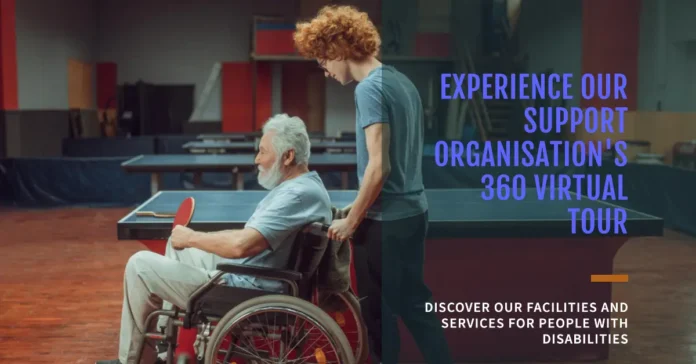Embark on a compassionate journey into the world of Disability Services Organizations through the lens of 360 virtual tours. This article explores the innovative and empathetic benefits of virtually touring support organizations dedicated to enhancing the lives of individuals with disabilities.
Benefits:
- Holistic Facility Exploration: Virtual tours offer a comprehensive exploration of Disability Services Organizations’ facilities. Users can virtually navigate through various departments, ensuring a holistic understanding of the organization’s offerings, from counseling and advocacy to vocational training and community engagement.
- Introduction to Support Programs: Users can gain insights into the diverse support programs offered by the organization. Virtual tours can include overlays or links that provide detailed information about counseling services, educational programs, employment assistance, and other support initiatives tailored to individuals with disabilities.
- Meet the Team: Connect with the dedicated professionals behind the scenes. Virtual tours can introduce users to the organization’s team, including counselors, educators, and support staff. This personal touch fosters a sense of familiarity and trust for individuals exploring the services available.
- Interactive Workshops and Sessions: Some virtual tours may incorporate interactive workshops and sessions. Users can virtually participate in sample sessions or workshops offered by the organization, providing a glimpse into the supportive and educational aspects of the services provided.
- Accessible Resources Showcase: Explore a showcase of accessible resources available through the organization. Virtual tours can highlight libraries, online databases, and resource centers, allowing users to discover valuable materials related to disability awareness, advocacy, and self-help.
- Client Success Stories: Engage with real-life success stories. Virtual tours can include testimonials and success stories from individuals who have benefited from the organization’s services. This feature provides inspiration and reassurance for those seeking support.
- Information on Legal Rights and Advocacy: Virtual tours can include overlays or links with information on legal rights and advocacy services. Users can explore resources that empower them with knowledge about their rights and the advocacy support available to address specific needs.
- Event and Community Participation: Virtual tours may showcase events and community participation initiatives. Users can explore overlays or links that detail upcoming events, workshops, and community gatherings facilitated by the organization, fostering a sense of belonging and connection.
- Virtual Support Hotlines and Chat Services: Some virtual tours may integrate virtual support hotlines or chat services. Users can access overlays or links to connect with support professionals in real-time, providing immediate assistance or guidance for any queries or concerns.
- Accessibility Features and Accommodations: Explore the organization’s commitment to accessibility. Virtual tours can highlight the physical and digital accommodations in place, ensuring that the services provided are inclusive and accessible to individuals with various disabilities.
Conclusion:
360 virtual tours for Disability Services Organizations offer a compassionate and informative gateway into the vital support systems available for individuals with disabilities. By providing a virtual window into the facilities, programs, and people dedicated to fostering inclusivity, these tours empower individuals to make informed decisions about the support they seek. Step into a world of empathy, understanding, and assistance through the 360-degree lens of Disability Services Organizations’ virtual tours, where every click brings you closer to a supportive community and a brighter future.
Haut du formulaire
